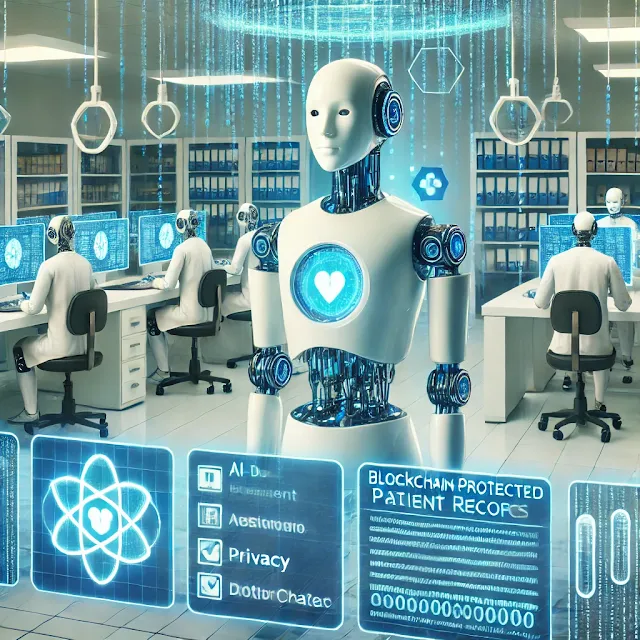The Role of AI in Crypto and Blockchain
Artificial Intelligence (AI) is transforming the cryptocurrency and blockchain landscape, enhancing security, efficiency, and innovation. This article explores the multifaceted role of AI in crypto and blockchain, highlighting its impact on various aspects of these technologies.
AI algorithms analyze vast amounts of data to detect anomalies and potential threats within blockchain networks. By identifying unusual patterns, AI enhances security measures, making blockchain systems more robust against attacks.
Optimizing Cryptocurrency Trading through AIIn cryptocurrency trading, AI assists in analyzing market trends and making predictions, enabling traders to make informed decisions. Machine learning models process historical data to forecast price movements, contributing to more effective trading strategies.
Streamlining Smart Contracts with AI IntegrationIntegrating AI into smart contracts automates complex decision-making processes. AI models embedded in smart contracts can execute tasks such as dispute resolution and selection of optimal methods in various scenarios, enhancing efficiency and reducing human intervention.
Improving Data Management and PrivacyThe combination of AI and blockchain enhances data management by ensuring data integrity and privacy. Blockchain provides a secure and transparent ledger, while AI processes and analyzes the data, ensuring that sensitive information remains protected.
Driving Innovation in Decentralized Applications (DApps)AI contributes to the development of more intelligent and responsive decentralized applications. By leveraging AI, DApps can offer personalized user experiences and advanced functionalities, pushing the boundaries of what decentralized technologies can achieve.
Enhancing Blockchain Scalability with AI SolutionsAI addresses scalability challenges in blockchain by optimizing data processing and transaction validation. Through predictive analytics and efficient data management, AI helps in handling larger volumes of transactions without compromising speed or security.
Facilitating Autonomous Economic AgentsThe integration of AI and blockchain enables the creation of autonomous economic agents capable of conducting transactions and making decisions without human intervention. This synergy opens new avenues for automation in various industries.
Enhancing Supply Chain Transparency and EfficiencyIn supply chain management, AI and blockchain work together to provide transparency and traceability. AI analyzes data stored on the blockchain to optimize logistics, predict demand, and ensure the authenticity of products.
Advancing Healthcare Data ManagementThe healthcare sector benefits from AI and blockchain integration by ensuring secure and efficient data management. Blockchain secures patient records, while AI analyzes the data to provide insights into patient care and treatment outcomes.
Enhancing Financial Services with AI and BlockchainIn financial services, the combination of AI and blockchain enhances transaction efficiency, fraud detection, and customer service. AI analyzes transaction data to detect fraudulent activities, while blockchain ensures the security and transparency of financial records.
Promoting Environmental SustainabilityAI and blockchain contribute to environmental sustainability by optimizing resource management and promoting energy efficiency. For instance, AI can predict energy demand, and blockchain can facilitate transparent tracking of energy consumption and carbon credits.
Enhancing Intellectual Property ManagementThe integration of AI and blockchain offers innovative solutions for managing intellectual property rights. Blockchain provides a tamper-proof record of ownership, while AI assists in monitoring and enforcing these rights, ensuring creators receive due recognition and compensation.
Facilitating Decentralized Finance (DeFi) InnovationsIn the DeFi space, AI and blockchain work together to create more efficient and secure financial products. AI algorithms manage risk and optimize investment strategies, while blockchain ensures transparency and security in financial transactions.
Enhancing Voting Systems with AI and BlockchainThe combination of AI and blockchain can improve the integrity and efficiency of voting systems. Blockchain provides a secure and transparent ledger of votes, while AI analyzes voting data to detect anomalies and ensure fair outcomes.
AI and blockchain together offer robust solutions for identity management. Blockchain provides a secure and immutable record of identities, while AI verifies and authenticates these identities, enhancing security in various applications.
The integration of AI and blockchain enhances IoT applications by providing secure data exchange and intelligent decision-making capabilities. Blockchain secures data from IoT devices, while AI analyzes this data to enable autonomous actions.
In education, AI and blockchain work together to create personalized learning experiences and secure academic records. AI tailors educational content to individual needs, while blockchain ensures the integrity and verifiability of academic credentials.
The combination of AI and blockchain enhances transparency in charitable organizations. Blockchain tracks donations to ensure they reach intended recipients, while AI analyzes data to assess the impact and efficiency of charitable programs.
Frequently Asked Questions (FAQs)
1. How is AI used in cryptocurrency trading?
AI is used in crypto trading to analyze market trends, predict price movements, and automate trading strategies using machine learning and deep learning models. It enhances decision-making and reduces risks for traders.
2. Can AI improve blockchain security?
Yes, AI enhances blockchain security by detecting fraudulent transactions, identifying network anomalies, and preventing cyber threats through real-time monitoring and predictive analytics.
3. How does AI optimize smart contracts?
AI improves smart contracts by automating decision-making, ensuring efficiency, and detecting vulnerabilities in contract codes, reducing errors and improving security.
4. What role does AI play in blockchain scalability?
AI optimizes blockchain scalability by improving transaction speed, managing large datasets efficiently, and reducing congestion through predictive analysis and machine learning algorithms.
5. Can AI and blockchain be used together in the financial sector?
Yes, AI and blockchain are transforming financial services by enhancing fraud detection, automating transactions, improving risk assessment, and securing digital identities.
6. How does AI enhance data privacy in blockchain?
AI strengthens data privacy in blockchain by implementing advanced encryption techniques, anonymizing user data, and ensuring secure data access through AI-driven authentication.
7. What are some real-world applications of AI in blockchain?
AI and blockchain are used in cryptocurrency trading, supply chain management, healthcare, financial services, identity verification, smart contracts, and fraud prevention.
#AI #RoleOfAIinCryptoandBlockchain #FutureOfDigitalAssest #CryptoWallet #CryptoCurrency





%20interfaces%20flo.webp)







No comments:
Post a Comment
I genuinely appreciate you taking the time to read this blog post. Your support, comments, and engagement mean so much to me. Whether you’re here for the first time or have been following along for a while, I’m grateful to have you as part of this journey.
If you found value in this post, please consider sharing it or leaving a comment—your feedback helps me create content that resonates with you. Thank you for being a part of this community!
Warm regards,
Daily Boost Guide